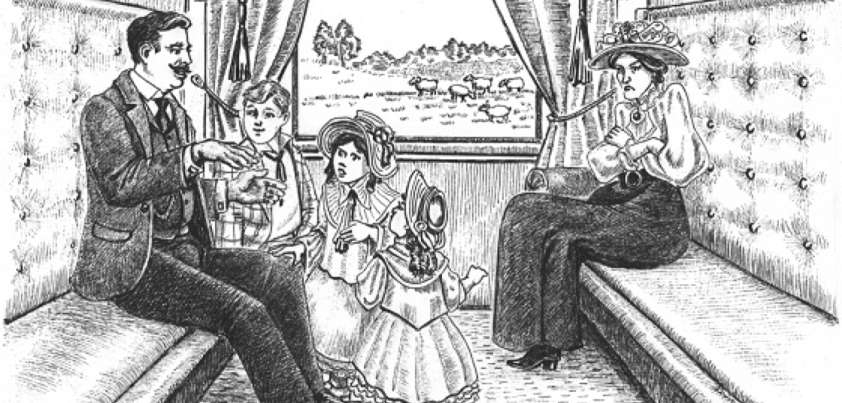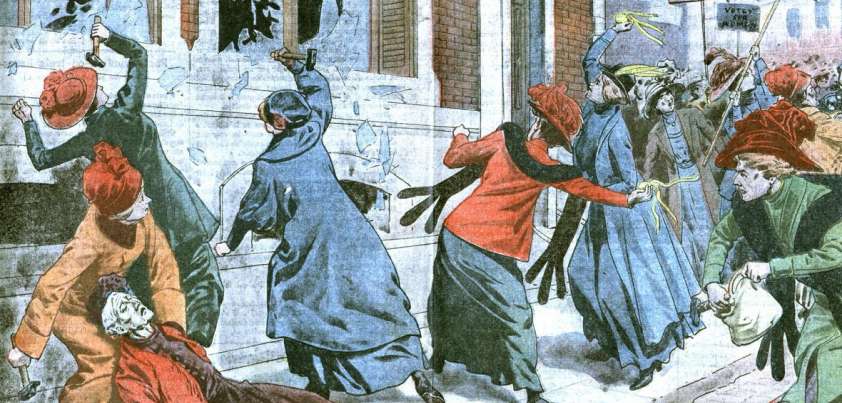 In this dark story by Saki, a sickly ten-year-old boy masks his hatred for the “Woman”, a controlling guardian who thwarts his every pleasure in his life. To cope, he acts out fantasies in a disused tool-shed in a forgotten corner of her garden. There, in response to the Woman’s religious zeal, he worships a caged polecat-ferret named Sredni Vashtar. When she notices his absorption in the tool-shed and tries to clear it out, Sredni Vashtar answers his prayers. Themes include oppression vs. freedom, isolation and loneliness, imagination vs. reality, religion, rebellion, revenge. More…
In this dark story by Saki, a sickly ten-year-old boy masks his hatred for the “Woman”, a controlling guardian who thwarts his every pleasure in his life. To cope, he acts out fantasies in a disused tool-shed in a forgotten corner of her garden. There, in response to the Woman’s religious zeal, he worships a caged polecat-ferret named Sredni Vashtar. When she notices his absorption in the tool-shed and tries to clear it out, Sredni Vashtar answers his prayers. Themes include oppression vs. freedom, isolation and loneliness, imagination vs. reality, religion, rebellion, revenge. More…
Archives
The Lumber Room
 This humorous story by Saki describes a clever but mischievous boy’s efforts to explore the wonders of his house’s off-limits-to-children lumber-room. [Not to be confused with planks of wood, the word “lumber” here is a British term for miscellaneous stored articles.] In disgrace for putting a frog in his breakfast bowl, the boy devises an elaborate plan to distract his strict aunt while in the forbidden room. His day gets even better when the suspicious woman falls into a rain-water tank and he tricks her into giving him cause to leave her there. Themes: mischief, curiosity, imagination, oppression, defiance More…
This humorous story by Saki describes a clever but mischievous boy’s efforts to explore the wonders of his house’s off-limits-to-children lumber-room. [Not to be confused with planks of wood, the word “lumber” here is a British term for miscellaneous stored articles.] In disgrace for putting a frog in his breakfast bowl, the boy devises an elaborate plan to distract his strict aunt while in the forbidden room. His day gets even better when the suspicious woman falls into a rain-water tank and he tricks her into giving him cause to leave her there. Themes: mischief, curiosity, imagination, oppression, defiance More…
Filboid Studge
 This story is from Saki is a spoof on modern advertising. A businessman who had invested all his money into a failed breakfast food requests help from an impoverished artist who wants to marry his daughter. The artist gives the product an unappetising name and promotes it with a poster of celebrities in Hell clamouring for the unpalatable dish “they cannot buy now”. Sales take off, and the businessman sells the company and marries his daughter to someone a “vast deal higher” than the hapless artist. Themes include despair, the power of advertising, branding (appeal to duty/guilt), social class, ingratitude/betrayal. More…
This story is from Saki is a spoof on modern advertising. A businessman who had invested all his money into a failed breakfast food requests help from an impoverished artist who wants to marry his daughter. The artist gives the product an unappetising name and promotes it with a poster of celebrities in Hell clamouring for the unpalatable dish “they cannot buy now”. Sales take off, and the businessman sells the company and marries his daughter to someone a “vast deal higher” than the hapless artist. Themes include despair, the power of advertising, branding (appeal to duty/guilt), social class, ingratitude/betrayal. More…
The Storyteller
 This story by Saki satirizes the way many traditional children’s stories had become so “sanitized” during the prudish Victorian period that they lost much of their original appeal. A major theme of the story is pride. The outer or “frame” story highlights the Aunt’s false pride in thinking that a bachelor couldn’t possibly tell a better children’s story than she could. The inner story illustrates the meaning of the English idiom Pride comes before a fall. Other themes include childhood, curiosity, control, “goodness” vs. reality (not all good people/things in life end happily!) More…
This story by Saki satirizes the way many traditional children’s stories had become so “sanitized” during the prudish Victorian period that they lost much of their original appeal. A major theme of the story is pride. The outer or “frame” story highlights the Aunt’s false pride in thinking that a bachelor couldn’t possibly tell a better children’s story than she could. The inner story illustrates the meaning of the English idiom Pride comes before a fall. Other themes include childhood, curiosity, control, “goodness” vs. reality (not all good people/things in life end happily!) More…
The Interlopers
 This story by Saki has perhaps the shortest surprise ending of all: a single word that comprises the last line of the story. Two families have been feuding for years over the use of a poor piece of forest land. When the heads of the families find themselves trapped under a fallen tree, they realize how silly they have been and promise to be friends for life. Sadly, just as they are looking forward to a more peaceful future, some unexpected visitors spoil it all. Themes: greed, pride, inherited hatred, man vs. nature, social class. More…
This story by Saki has perhaps the shortest surprise ending of all: a single word that comprises the last line of the story. Two families have been feuding for years over the use of a poor piece of forest land. When the heads of the families find themselves trapped under a fallen tree, they realize how silly they have been and promise to be friends for life. Sadly, just as they are looking forward to a more peaceful future, some unexpected visitors spoil it all. Themes: greed, pride, inherited hatred, man vs. nature, social class. More…
The Mouse
 This story by Saki satirizes the social sensitivities of the late-Victorian/Edwardian middle class. A prudish young man who has had a sheltered upbringing returns to the city from a farm visit. Sharing his train compartment is a woman who appears to be sleeping. He soon finds they are not alone… he has a mouse in his pants! To avoid offending the woman and causing a scene, he removes his trousers by hiding behind a blanket. Unfortunately, the blanket falls before can he put them on again and the woman wakes up. Themes include propriety, embarrassment, dissimulation, insensitivity towards others. More…
This story by Saki satirizes the social sensitivities of the late-Victorian/Edwardian middle class. A prudish young man who has had a sheltered upbringing returns to the city from a farm visit. Sharing his train compartment is a woman who appears to be sleeping. He soon finds they are not alone… he has a mouse in his pants! To avoid offending the woman and causing a scene, he removes his trousers by hiding behind a blanket. Unfortunately, the blanket falls before can he put them on again and the woman wakes up. Themes include propriety, embarrassment, dissimulation, insensitivity towards others. More…
The Open Window
 This story by Saki satirizes the social obligations imposed upon the middle and upper classes by late-Victorian/Edwardian etiquette. A pompous hypochondriac is holidaying in a peaceful country village as treatment for a nervous condition. He doesn’t like visiting strangers, but does so as a courtesy to his sister who has written letters of introduction to people she knows there. During one such visit, an imaginative fifteen-year-old girl plays an innocent practical joke on the neurotic man, causing him to run from her house in horror. Themes include social conventions, perception (appearance vs. reality), gullibility, escapism, deception. More…
This story by Saki satirizes the social obligations imposed upon the middle and upper classes by late-Victorian/Edwardian etiquette. A pompous hypochondriac is holidaying in a peaceful country village as treatment for a nervous condition. He doesn’t like visiting strangers, but does so as a courtesy to his sister who has written letters of introduction to people she knows there. During one such visit, an imaginative fifteen-year-old girl plays an innocent practical joke on the neurotic man, causing him to run from her house in horror. Themes include social conventions, perception (appearance vs. reality), gullibility, escapism, deception. More…
Hermann the Irascible (Story of the Great Weep)
 This story by Saki is a classic example of the use of reverse psychology to achieve a desired result… in this case, shutting down the women’s suffrage movement. The story first appeared in 1909 at the height of mass demonstrations of both men and women in support of the cause. I have seen some suggestions that the story trivializes women’s rights. This misses the point that Saki’s use of satire is so “over the top” here that, rather than mocking suffrage, the story highlights and supports it. Themes include human rights, tyranny, manipulation through excess. More…
This story by Saki is a classic example of the use of reverse psychology to achieve a desired result… in this case, shutting down the women’s suffrage movement. The story first appeared in 1909 at the height of mass demonstrations of both men and women in support of the cause. I have seen some suggestions that the story trivializes women’s rights. This misses the point that Saki’s use of satire is so “over the top” here that, rather than mocking suffrage, the story highlights and supports it. Themes include human rights, tyranny, manipulation through excess. More…
Tobermory
 This story by Saki is a satire of early twentieth century British high society. A group of socialites attend a weekend house-party. Among the guests is a visiting scientist who was invited in the hope that his cleverness would contribute to the general entertainment. All are amazed when he teaches Tobermory, the family housecat, to speak perfect English. However, their surprise soon turns to anger at some of the things Tobermory has to say. This seals Tobermory’s fate… he knows too much and must be silenced! Themes include wonder, superficiality and hypocrisy, embarrassment, anger, retribution More…
This story by Saki is a satire of early twentieth century British high society. A group of socialites attend a weekend house-party. Among the guests is a visiting scientist who was invited in the hope that his cleverness would contribute to the general entertainment. All are amazed when he teaches Tobermory, the family housecat, to speak perfect English. However, their surprise soon turns to anger at some of the things Tobermory has to say. This seals Tobermory’s fate… he knows too much and must be silenced! Themes include wonder, superficiality and hypocrisy, embarrassment, anger, retribution More…